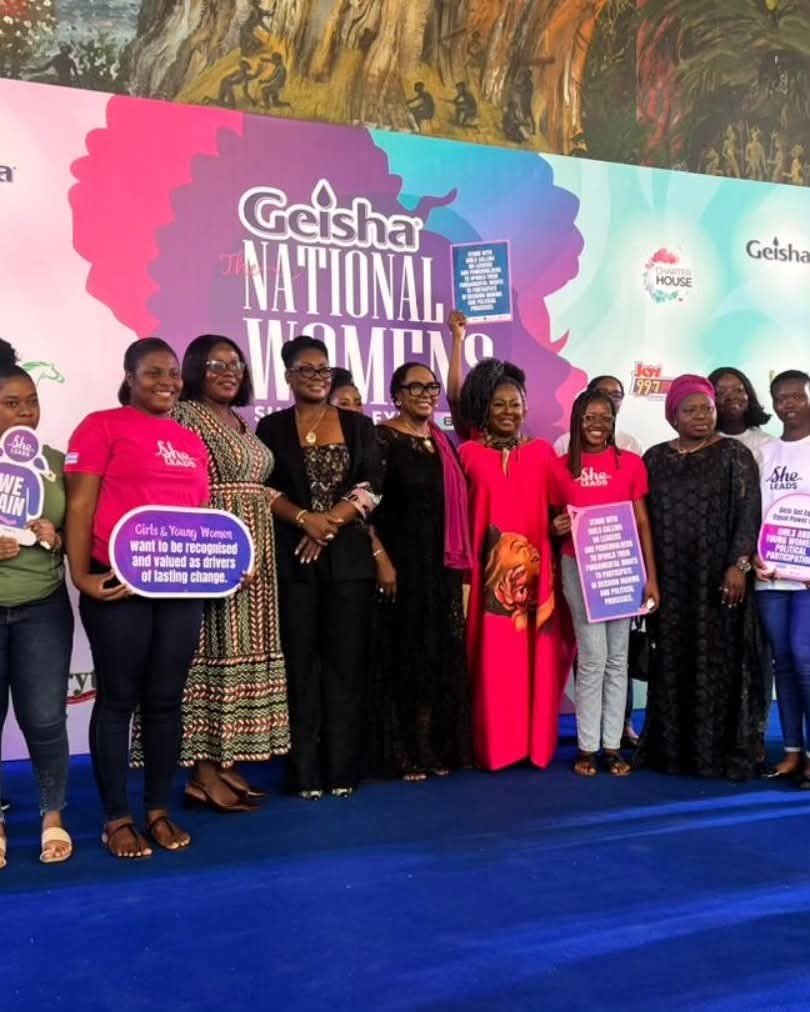News
The 7th National Women’s Summit & Expo introduces Industry Spotlight

As the world confronts the complex challenges of sustainable development, food security, and economic growth, one thing is clear: women are essential to the future of agribusiness.
Recognizing this vital contribution, the 7th National Women’s Summit & Expo is set to shine a spotlight on women in agribusiness through its new Industry Spotlight Series with an event dubbed; ‘Women in Agribusiness Industry Mixer’.
This exciting initiative aims to elevate the voices, achievements, and impact of women within the agricultural sector, ultimately strengthening Ghana’s food value chain and boosting economic development. The event is slated for Friday, 21st February at the Kosmos Innovation Center at 5pm prompt.
Agriculture: The Backbone of Ghana’s Economy
Agriculture is the beating heart of Ghana’s economy, supporting millions of livelihoods—particularly those of women.
The sector accounts for around 20% of the country’s GDP and plays an essential role in driving economic growth. Women are at the forefront of food production, processing, distribution, and market innovation, making crucial contributions to the sector’s ongoing development. Yet, despite their significant impact, women in agribusiness still face barriers such as limited access to finance, technology, and markets, which hinder their full participation and potential.
Unlocking the Potential of Women in Agribusiness
The 7th National Women’s Summit & Expo aims to tackle these challenges head-on, providing a platform for engagement, knowledge-sharing, and policy discussions.
On February 21, 2025, the Women in Agribusiness Industry Mixer at the Kosmos Innovation Center will gather women entrepreneurs, agribusiness professionals, investors, and key stakeholders.
The event will facilitate idea exchange, explore potential partnerships, and drive collaborative solutions. Discussions will focus on four critical areas:
The 7th National Women’s Summit & Expo 2025 is more than just an event—it’s a call to action for gender equality. By focusing on agribusiness, an industry crucial to economic transformation, this year’s summit will serve as a launchpad for meaningful engagement, policy dialogue, and business opportunities.
Participants will
• Network with industry leaders, investors, and policymakers
• Explore partnerships and collaborative solutions
• Engage in high-level discussions on key industry challenges
• Showcase innovative products and services
• Champion the future of women in agribusiness
At the National Women’s Summit & Expo on March 7, will focus thought-provoking and in-depth discussion on “Women in Agribusiness” as part of our Industry Spotlight series.
Additionally, they will delve into the following topics;
1. Access to Finance and Investment Opportunities for Women in Agriculture
Access to finance remains one of the biggest hurdles for women in agribusiness, restricting their ability to scale and innovate. The Industry Mixer will offer a unique opportunity for women entrepreneurs to connect with investors, financial institutions, and development partners, exploring innovative financing models and investment opportunities that can fuel growth.
2. Sustainable and Innovative Agricultural Practices
As pressure mounts for the agricultural sector to adopt sustainable and innovative practices, the event will spotlight best practices in sustainable agriculture. Success stories will be shared, and participants will gain insights into innovative approaches that enhance productivity while minimizing environmental impact in production, processing, and distribution.
3. Market Expansion and Value Chain Optimization
Many women in agribusiness struggle with limited access to markets and value chains.
The mixer will focus on strategies to overcome these barriers, facilitating discussions on how women-led ventures can tap into local, regional, and even global markets, thereby unlocking growth and expanding their reach.
4. Policy Advocacy for Gender-Inclusive Agribusiness Growth
To create an environment where women in agribusiness can truly thrive, policy reform is key.
The event will bring together policymakers, industry leaders, and civil society organizations to discuss and advocate for policy initiatives that foster gender-inclusive growth within the agribusiness sector.
The Industry Spotlight Series – Women in Agribusiness is a Charterhouse production and brought to you by Geisha in partnership with Kosmo Innovations Center.
Admission is absolutely free!
News
Prioritise affordable treatment of sickle cell treatment —Health Expert

Health experts have urged Ghana to prioritise affordable and accessible treatment for sickle cell disease (SCD) as advanced, but costly curative therapies remain out of reach.
SCD, an inherited blood disorder, affects about three in every 100 newborns in Ghana.
Globally, around 1,000 babies are born with the condition daily, with three-quarters in sub-Saharan Africa.
The disease causes severe complications including chronic pain, anaemia, infections, strokes and organ damage, often leading to shortened life expectancy.
In recent years, gene therapy has been developed as a potential cure.
However, its cost—running into millions of dollars per patient—makes it financially and technically inaccessible in Ghana.
According to Dr Lawrence Osei-Tutu, a Sickle Cell and Childhood Cancer Expert at the Komfo Anokye Teaching Hospital, “the country must instead focus on practical, lower-cost interventions such as hydroxyurea”, a decades-old cancer drug proven to reduce painful episodes, hospitalisation and life- threatening complications in SCD patients”.
Taken orally, the medicine improves red blood cell function and is considered safe and effective.
“Hydroxyurea therapy is as good as the cure and a low-hanging fruit to pluck, we must bring a cure to our sickle cell warriors, but do so sustainably.” he urged.
In a chat with The Spectator here, he said to create awareness on the disease, the expert noted that despite its benefits, “hydroxyurea is not widely accessible in Ghana.”
Stressing that, “many patients either cannot afford it or struggle with irregular supply through the health system.”
Moreover, he argued that scaling up access would provide immediate relief while the country builds the infrastructure, trains specialists and secures funding needed to support curative therapies in the future.
With an estimated 15,000 babies born with sickle cell disease annually in Ghana, Dr Osei Tutu cautioned that “failure to improve access to effective treatment will leave many patients vulnerable to preventable complications and early death.”
From Kingsley E. Hope, Kumasi
Join our WhatsApp Channel now!
https://whatsapp.com/channel/0029VbBElzjInlqHhl1aTU27
Hot!
Let’s reintroduce Cultural Studies to complement educational reforms — Tourism Minister

Madam Abla Dzifa Gomashie, the Minister of Tourism, Culture and Creative Arts, has emphasised the importance of reintroducing Cultural Studies in schools as part of Ghana’s broader educational reform agenda.
She said Cultural Studies would complement existing efforts to reposition Science, Technology, Engineering and Mathematics (STEM) and Technical Vocational Education and Training (TVET) to promote digital literacy and expand Creative Arts education.
Speaking at the 2025 Homowo Festival of the people of Ningo-Prampram, held on the theme: “Education: The Best Legacy for our Children,” Madam Gomashie said cultural education was critical to national identity and development.
She noted that the festival’s theme aligned with the Government’s vision to transform education in Ghana and encouraged the youth to embrace it not only as a means of personal development but also as a way of preserving traditional values.
These values, including patience, wisdom, and hard work, were at the core of the Homowo celebration, the Minister said.
“Cultural festivals like Homowo are vital instruments for strengthening cultural identity, preserving historical memory, and fostering national unity. Additionally, festivals serve as platforms for educating the youth through storytelling, music, dance, and other traditional practices, while also providing opportunities for community engagement.”
Madam Gomashie highlighted the strong foundation that Ghana’s tourism was built on, which included culture, traditions, and the creative industry, collectively contributing to over GH¢4.8 billion to the economy.
“Festivals give tourists reasons to visit our country. Therefore, with the right infrastructure and the development of all the domains, the sector can do more than what has been recorded,” she added.
Mr Sam Nartey George, the Member of Parliament for Ningo-Prampram and Minister of Communication, Digital Technology and Innovation, commended the community for their vibrant participation in the festival. He announced plans for the construction of a new nursing training school in Ningo, aimed at expanding access to healthcare education in the area.
Nene Osroagbo Djangmah XII, Paramount Chief of Great Ningo Traditional Area; King Dr Tackie Teiko Tsuru II, Ga Mantse; Nene Tetteh Wakah III, Paramount Chief of the Prampram Traditional Area; Prof. Odaifio Welentsi III, Paramount Chief of the Nungua Traditional Area; Naana Dugbakuwor Dugba II, Paramount Queen Mother of Great Ningo; and Mr. Elvis Afriyie Ankrah, Special Envoy on Religion and Inter-Faith Affairs, who represented the Chief of Staff, were among dignitaries at the festival. -GNA














